Met’s enjoyable”Zauberflöte” finds true art in theatrical artifice
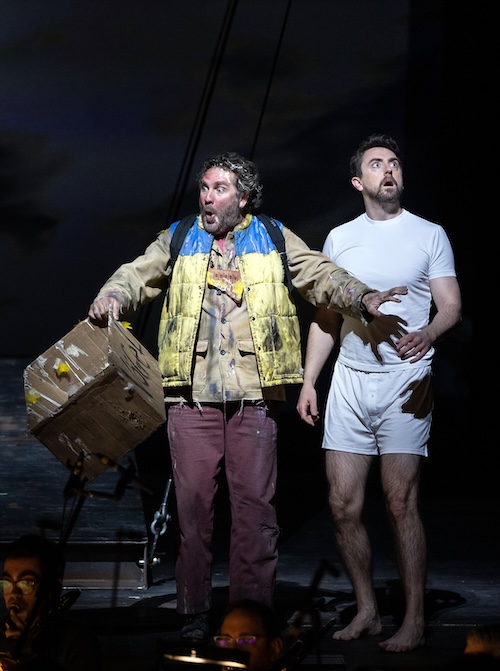
An opera that first opened in 1791, doesn’t have to be put in front of an audience today so it looks like 1791 on stage. The operas that have lasted from history were never meant to be preserved under glass, especially ones that were presenting dramas of their time.
Sunday afternoon, the Metropolitan Opera opened its revival of Simon McBurney’s production of Mozart’s Die Zauberflöte. Debuted during the 2022-2023 season, it is brilliant and entertaining in every way, and by being both authentic and contemporary, it’s one of the most fully Mozartian stagings one can experience.
And Sunday it was also excellent musically. The cast for this season starts with Ben Bliss, the leading American Mozart tenor, as Tamino, with soprano Golda Schultz as Pamina. Returning from the first run are baritone Thomas Oliemans as Papageno, soprano Kathryn Lewek as the Queen of the Night, and bass Stephen Milling as Sarastro. Evan Rogister is the new conductor for this revival.
Also returning, though not as cast members, are on-stage foley artist Ruth Sullivan and visual artist Blake Habermann, who are integral to the execution and concept of this production. This is an opera staging about not just the story but how theater is made—and how Mozart and Emanuel Schikaneder made Die Zauberflöte—which is tremendously entertaining and profoundly honors what this opera is, going all the way back to its premiere.
Die Zauberflöte is about Enlightenment values, and it presents these through the lens of myth and magic. Mozart and Schikaneder were presenting identifiably contemporary performers to their contemporary audience, which knew that what they were seeing was artifice, both in the stage mechanics and the very artificial form of people singing drama at listeners. The visual artist and foley artist are part of that tradition, as is dressing Tamino in a track suit and the Three Ladies in camouflage hunting gear, and presenting Sarastro and the members of his temple as a business-like group closer to contemporary Masons.
This opera has been cut and reassembled through the centuries; this production has the full dialogue—which is essential—and of course all the glorious music. This is something of a luxury cast, and the performances Sunday were almost uniformly superb. Bliss has been singing Mozart for years, and at this point has a fine balance between boyish lightness and a sense of maturity. In a production that centers performers over sets his “Dies Bildnis ist bezaubernd schön” was a convincing expression of love and longing, and that substance made the experience that much more compelling.
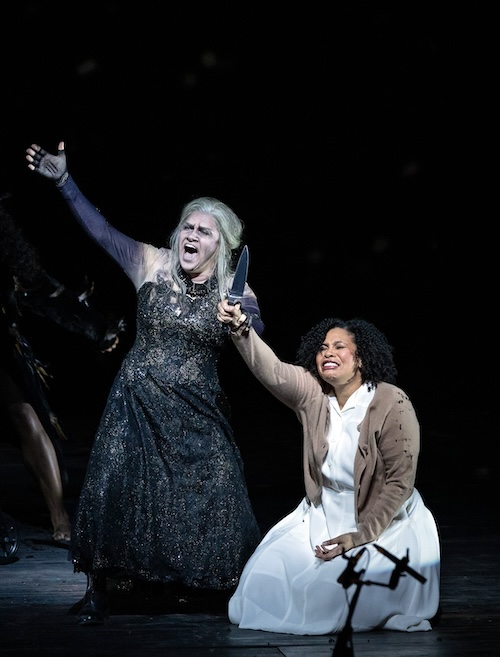
Schultz had a golden tone as Pamina, and a similar balance of fun and seriousness. Her “Ach, ich fühl’s” was luminous and resonant, with elegance and a matter-of-fact phrasing that opened up the beauty in the musical line and the weight of emotion.
With these leads feeling like real people, Oliemans’ terrific performance was set in further relief. Vocally, the role is not meant to sound operatic, and he never overdid the singing, keeping a nice bluntness to the heft of his voice. He worked hard—he has to carry a step ladder around for most of the opera and in Act II heads through a row in the audience, looking for a wife—but never dipped from his loose, amiable energy.
McBurney restores some Act II dialogue between Pamina and her mother that is almost always cut. It’s a puzzle why, because it makes the entire opera work—the Queen explains that her deceased husband had owned the temple and promised it to her when he died, but then switched it to Sarastro. This not only explains why they are adversaries, but also that they are closely connected in a way. That added profound emotional depth to Lewek’s already spectacular singing. The technique was all there Sunday, and her voice sounded even fuller and more lustrous than in the holiday Magic Flute. Her “Der Hölle Rache” was thrilling vocally and dramatically meaningful and powerful.
Milling has an ideal presence as Sarastro, tall and commanding and also sympathetic. Though his voice at time collapsed at the very bottom of this demanding part, most of his singing was rounded and strong with a regal phrasing. Against him, bass-baritone Shenyang’s Speaker was magnetic, while tenor Thomas Ebenstein was perhaps a little too frantic as Monostatos, flying past rather than punching through the music.
The two trios were also at a high level. The Three Ladies of Alexandria Shiner, Olivia Vote, and Tamara Mumford were full of sexy glee, and Nico Hwang, Marcus Agrippa, and Ori Wosner as the Three Boys (ancient and decrepit) had fine intonation and a nice edge to their timbres.
Rogister led an energetic, colorful, and generally crisp performance. With the orchestra elevated above the lip of the pit, as in the 18th century, the sound was full and satisfying. The conductor favored a quick tempo through much of the performance, although at times not all the winds nor the singers were at the same speed, and the music under Papageno’s “Der Vogelfänger bin ich ja” was a little mushy.
Nothing took away from the overall effect of this staging though. The way Sullivan and Habermann put the mechanics of theatrical magic on display adds to the delight, and is part of a concept that integrates everything into performing the opera. Flutist Chelsea Knox comes onstage for the Act I “magic flute” solo, Katelan Trân Terrell pops up from the pit to help out Papageno with the bells, even Rogister sings briefly as part of a musical joke. Nothing is wasted, every gesture and moment is meaningful, so much so that the final bars, with the orchestra standing and the cast waving to the audience with powerful effect, absolutely delivers light over darkness, love over hate, and a reconciliation between Sarastro and the Queen that goes far beyond mere entertainment.
Die Zauberflöte runs through April 26. metopera.org
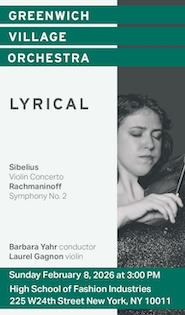
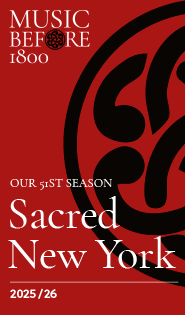
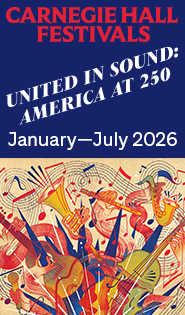
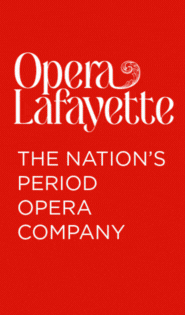

Posted Mar 29, 2025 at 8:23 pm by Tom Rush
Saw opera last night. Most enjoyable opera I have seen beginning to end. No dull moments. Lewek was spectacular. Hit every high note perfectly.
And great and comprehensive review. Great job!
Posted Mar 30, 2025 at 9:30 pm by Jacques Gouallou
Very mixed feeling about this “trashy” mise en scene. It is more an ode to ugliness and indecency than a celebration of beauty or love…there is nothing beautiful about the staging or the costumes…the uglier the better seems to be the motto of this staging.
Instead of being uplifted by the beautiful message of this enlightening opera, we are dragged down in the lower depths and forced to watch the following display: 3 women fully naked barely covered by a translucent veil, one of them having her head half shaved, Papageno as a tramp covered in bird shit, and an overall dark and grey Kafkaian tone to the whole setup that would perfectly fit a Brecht’s play…or a Soviet era drama.
Thankfully there is still the music and the arias that are perfectly performed by a cast unfairly ridiculed by this “WOKE” mise-en-scene. But one would expect another quality level from MET Opera.
Posted Apr 05, 2025 at 9:29 am by Michael D Fatsi
Beautiful musically. Why does it have to be so ugly? It seems production went out of its way to make everything as ugly as possible. Sweatsuits for the main characters in the first act…Please.
Posted Apr 06, 2025 at 3:56 pm by Diana DePierro
As I was seated, the first thing I noticed was the blank stage. My first thought was that the stage designer was late! Then the lights rose upward and the overture began and I realized ..This was the entire set!
I stayed until the very end. The enchanting score that Mozart conceived was desecrated in my eyes. The ‘costumes” were cheap as was the entire production. A floating stage?
The best part of the production was, the MUSIC! Wolfgang I apologize for they knew not what they did! Art is dead at the Met. tears
Posted Apr 08, 2025 at 10:58 pm by Yuliya
Quite disappointed in this production. I found it even inappropriate in some places, unattractive and disturbing. No decorations, dark, gloomy and somewhat depressing. It’s Mozart, suppose to be light and beautiful.
Holiday production is so much more pleasant and classy. This version is artistic and interesting from that point of view. But I wanted more uplifting and more elegant opera. And what with those costumes? Please go back to classic.
Posted Apr 10, 2025 at 11:19 am by peter lederman
…saw this last night…profound in its simplicitiy…overwhelming in its joy and humanity (especially in these dark days) …felt more connected to what was on a stage in front of me than ever…left with a feeling of awe…
Posted Apr 24, 2025 at 9:25 am by Jane Emery
So disappointed as I was looking forward to the full version. There was no elegance in the staging, the costumes. The funny screen platform moving up and down was silly. The side distraction of a woman preparing food?? I don’t know what she was doing.
The military jungle outfits looked ridiculous. The costumes that revealed the bodies of the women were very unattractive The only good thing about the opera was the beautiful singing.
Posted Apr 24, 2025 at 1:47 pm by Mary Kautzman
Thumbs down, there were a few redeeming qualities to the update but overall an embarrassment to the art. Did the costume designer embezzle the funds? Were the extras offered parts if they could get ten family members to pay for a seat (most of whom were amateurs at best).
And why was the Queen of the night presented as an invalid? In spite of praise, Lewis could have benefited from not having to feign bad posture.
Truly a disgusting disappointment.
Posted Apr 27, 2025 at 11:02 am by Mirel
Extremely beautiful and very contemporary production.
The “woke” mix en scene critics should go live in the 18th century.